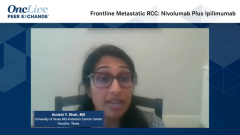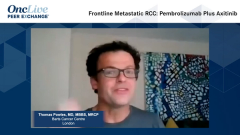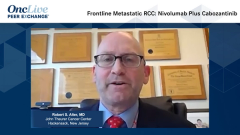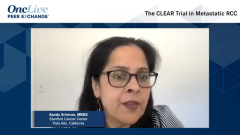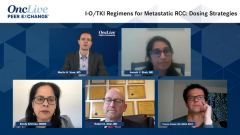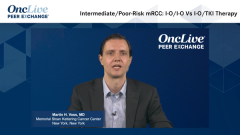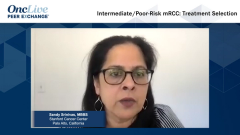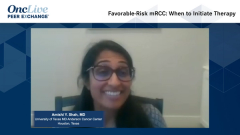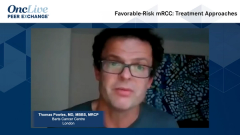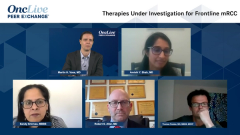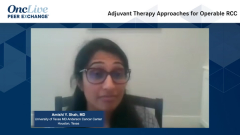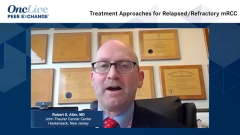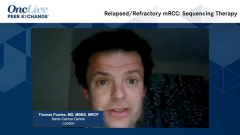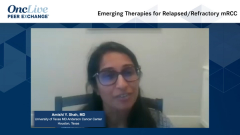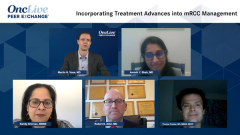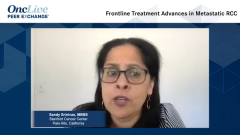
Relapsed/Refractory mRCC: Sequencing Therapy
Considerations for how to approach a patient with metastatic renal cell carcinoma previously treated with ipilimumab and nivolumab, followed by nivolumab maintenance.
Episodes in this series

Martin H. Voss, MD: I want to speak a little about a unique second-line scenario that oncologists see themselves faced with now with their patients: a patient who was treated up front with ipilimumab-nivolumab with a good response following the induction therapy who then loses the response while they’re on maintenance nivolumab therapy. Without clear guidance as to what to do after that, we’re faced with a couple of difficult choices. I have seen patients referred to me and had conversations with patients going through all kinds of scenarios. I’ve seen patients who came to me who had been treated with ipilimumab-nivolumab, lost the response, and were given more ipilimumab by their oncologist. There’s a question as to whether to switch to a TKI [tyrosine kinase inhibitor]. Now with emerging data on TKI–I/O [immuno-oncology], the question becomes where you add a TKI to the nivolumab maintenance in someone who’s previously benefited from I/O therapy. Tom, maybe I’ll have you talk to that a bit. I’m sure you’ve come across this with your patients. What’s your thought process going through these many options we have in that scenario?
Thomas Powles, MD, MBBS, MRCP: My thought process is to try to keep things relatively simple because we haven’t got that much data. Breast cancer is complicated because they’ve got 3 other randomized trials. We don’t have any randomized trials. It’s actually really simple. What do we know? We know the VEGF-targeted therapies have more similarities than differences, and we know that the VEGF-targeted therapies are active or have a degree of activity post–first-line therapy. It looks like the response rate in the second line after ipilimumab-nivolumab might be slightly higher than the response rate after VEGF-TKI immunotherapy on some retrospective data, but even that’s pretty weak.
What do we know? We don’t see cures by more immunotherapy as it stands. Switching from pembrolizumab to atezolizumab or the other way around is not curing big groups of patients. We know that, No. 1. The sequencing of immunotherapy is pretty complicated and really experimental as it stands. It’s entirely justified at that point to stop the immunotherapy at progression.
The question is once you’ve stopped the immunotherapy, what’s the right VEGF-TKI to use? As I said previously, there are more similarities than differences. I can see why you might want to use axitinib. I can see why you might want to use cabozantinib. I personally don’t think we need drugs like tivozanib. It’s another drug and another decision. I’m not sure how much it helps, even with TIVO-3. If it was cheap and free, then yes, of course. I can see that being attractive. But as it stands, I don’t see a massive advantage. Lenvatinib-everolimus response rates look good, but the hazard ratio in the CLEAR trial was 1.14, with sunitinib trending a little better.
There’s always a question around whether you need to give those 2 drugs. You probably don’t. It comes back to what I’ve said so many times before. In the frontline setting, pick a drug and use it well. The most important thing is not which drug you choose. It’s making sure you see your patients regularly, they know when to stop the treatment, they know about the adverse effects, they’ve got a nurse to phone, they’re having regular blood tests, and they’ve got blood pressure monitors at home. The drug choice is maybe less important right now than the way we give the drugs.
Lastly, if you switch to a VEGF-TKI directly after immune therapy, remember that the immunotherapy has a long half-life and to expect increased immune VEGF toxicity during that combination period.
Martin H. Voss, MD: Those are all very relevant points for our patients. Thank you so much.
Transcript Edited for Clarity


